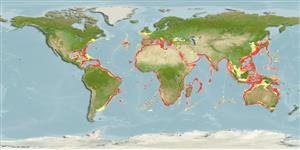Preferred temperature (Ref.
115969): 7.7 - 17.3, mean 11.4 (based on 1031 cells).
Phylogenetic diversity index (Ref.
82804): PD
50 = 0.5001 [Uniqueness, from 0.5 = low to 2.0 = high].
Bayesian length-weight: a=0.00219 (0.00169 - 0.00283), b=3.20 (3.12 - 3.28), in cm Total Length, based on LWR estimates for this species (Ref.
93245).
ระดับชั้นอาหาร (Ref.
69278): 4.1 ±0.4 se; based on diet studies.
ความสามารถในการกลับคืนสู่ปกติ (Ref.
120179): ต่ำ, เวลาต่ำสุดที่จะทำให้ประชากรเพิ่มขึ้นเป็น 2 เท่าใช้เวลา 4.5 - 14 ปี (Fec assumed to be <100).
Fishing Vulnerability (Ref.
59153): High to very high vulnerability (70 of 100).
Climate Vulnerability (Ref.
125649): Moderate vulnerability (43 of 100).
